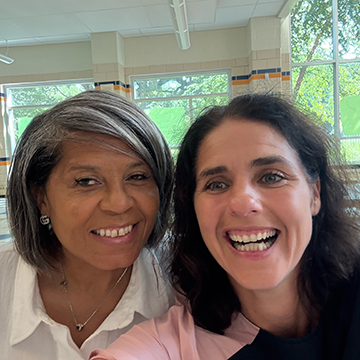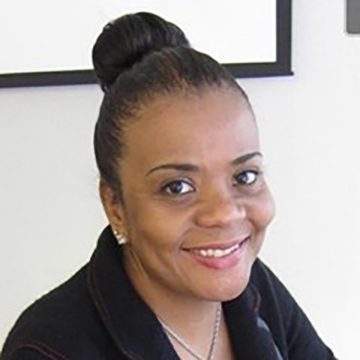Students as Tech Ambassadors: Bridging Generations to Support Stroke Survivors
Each year, more than 650,000 Americans survive a stroke — a sudden event that often reshapes life for survivors and their families.
“Stroke recovery does not end at hospital discharge,” says Tonya Roberson. “And recovery is not a solitary journey — it is shared between survivors, caregivers, families, healthcare professionals, and communities.”
With that in mind, Roberson serves as the community principal investigator on a research project comprised of community and academic partners that sought to develop simple, personalized interventions so stroke outcomes could be optimized in the context of people’s life situations.
“From the start of the ACROSS project, our Stroke Advisory Board emphasized the need to better connect survivors and caregivers with community resources, recognizing how difficult those resources can be to find and navigate online,” says Lesli Skolarus, MD, Vice Chair and Chief of Stroke and Vascular Neurology in the Department of Neurology. “Because kids are already tech ambassadors in their homes — the ones families rely on to solve technology challenges — we viewed them as experts in this space. Partnering with Student Karma, a school-based youth program working with Chicago Public Schools, we applied a user-centered design process that elevated students’ insights and lived experiences. This approach ensured the materials reflected the real needs of stroke survivors and caregivers while also giving youth the chance to lead, innovate, and strengthen connections across generations.”

The highly engaged facilitators and instructors did a great job speaking to the students on different topics to help advise them on ways to support their families.”
The NIH-funded and NUCATS supported Advancing Community Connections and Calculating Risk to Optimize Stroke Survivorship (ACROSS) project is being conducted with communities in Flint, Michigan, and Chicago. Its goal is to make stroke survivorship simpler and more attainable by connecting survivors to resources, easing treatment demands, and offering practical tools for daily life.
Building on the notion of young people as tech ambassadors, the CPS students co-designed step-by-step instructions for using FindHelp.org, a free online platform of local resources, and created motivational materials to encourage healthy living and use of community resources.
“It was a novel approach,” says Dori Collins, president of District Outreach Initiatives. “Utilizing the skills and talents of young people to support the elders in their families proved to be immensely successful. Many of these students live with their grandparents, who are at higher risk of stroke. The students engaged with training and learned to provide guidance for older individuals, creating space for them to educate and support themselves in new ways.”
The pilot partnership — which took place with students from Adam Clayton Powell Elementary School with the support of Principal Sheila Barlow — was rooted in reciprocity: while students contributed their digital and design expertise, they also gained knowledge in health and wellness, stroke and caregiving, research, user-centered design, and community advocacy through a five-week summer camp co-led by the ACROSS team. Together, the project highlighted how youth and community partners can co-create solutions that bridge digital divides and make health resources more accessible to all.
Stroke recovery does not end at hospital discharge. And recovery is not a solitary journey — it is shared between survivors, caregivers, families, healthcare professionals, and communities.”

For Roberson, the project was also personal. As a psychologist she brought both her professional experience in stroke awareness and her personal perspective as the primary caregiver for her mother, a four-time stroke survivor.
“My role was to help bridge hospital care with community-based recovery and to share insights that may support other families navigating similar challenges,” she says. “This collaboration created a model that is not only evidence-based but also accessible, empowering families with critical life skills and support they rarely receive in traditional care.”
Collins, who often partners with organizations in Chicago’s Bronzeville and South Side neighborhoods, saw great benefit in partnering with Northwestern.
“The highly engaged facilitators and instructors did a great job speaking to the students on different topics to help advise them on ways to support their families,” says Collins. “I think one of the biggest ways in which we could see the program was working was the outstanding student attendance. The positive learning experiences were also a highlight of the post-pilot feedback.”
Through meaningful community engagement, ACROSS will continue to increase clinical trial readiness, enhance community partnerships, invest in local public health capacity, and contribute to thriving communities.
“Whether working with survivors or students, ACROSS and Student Karma both show that when communities are engaged from the beginning and given respect, tools, and opportunities, people rise to the occasion — and together we can create programs that heal, empower, and transform lives,” says Roberson.
Written by Roger Anderson




